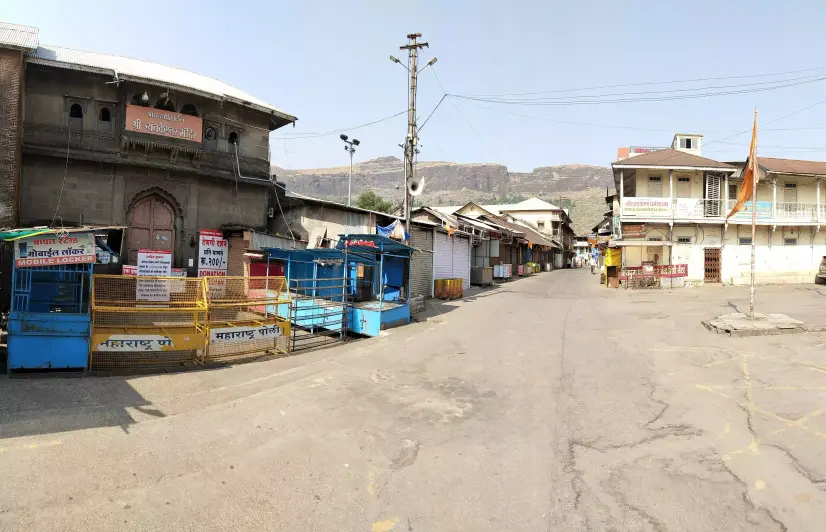Temple town Trimbakeshwar goes bankrupt due to COVID-19

Temple town Trimbakeshwar goes bankrupt due to COVID-19
Trimbakeshwar, Maharashta: The temple town Trimbakeshwar, one of the 12 Jyotirlingas (Lord Shiva shrine) in India, is facing an economic crisis owing to the COVID-19 pandemic. Located about 25 kilometres from Nashik, Maharashtra, the town has a population of about 12,500 people, out of which over 10,000 people are directly or indirectly dependent on the temple for their livelihood.
Over 1.5 crore pilgrims visit this temple town annually, often for rituals like Kaalsarpa dosh and Narayan Nagbali. However, with the lockdown extended, the Trimbakeshwar temple trust has suffered a loss of around Rs 50 crore in the past three months. Also, there is no hope of seeking any relief from the government on the opening of the religious places.
Prashant Gaydhani, president of the Trimbakeshwar Purohit Sangh, a body of priests, mentioned that about 3,500 purohits (priests), on whom 200 families are dependent, have been impacted by the lockdown. He added that apart from the priests, people who are directly or indirectly related to the religious rituals or tourism, including the flower vendors, prasad (food that is religious offering) shops, clothes, jewellers and auto-rickshaws drivers have also been affected.
He said that while the town would make about Rs 15-20 crore each month, the Trimbakeshwar Devasthan Temple Trust would earn about Rs 1 crore, but estimated that about 75% of the town’s population hasn’t earned anything since the lockdown was announced.
Gaydhani, who is also one of the trustees at the Trimbakeshwar Devasthan Trust, stated that since the number of COVID-19 cases is increasing daily, the municipal council has announced total lockdown until the end of this month, even though it is the holy month Shravan, according to Hindu calendar.
Open temples: Priest body member
Girish Joshi, a priest who conducts rituals at the Trimbakeshwar temple, mentioned that Shirdi, Saptashringi and Trimbakeshwar form an ideal religious triangle for the tourists and they prefer visiting these places in one trip.
Apart from the Shravan month, people visit in large numbers during Mahashivaratri as well, he mentioned, adding that the entire town has been affected by the lack of pilgrims.
Meanwhile, some priests are offering virtual ritual services. However, their act was condemned by the Trimbakeshwar Purohit Sangh and the priests facing the heat.
Lokesh Akolkar, who is a member of the priest body, stated that there is an emotional and spiritual connection in these rituals and the physical presence along with the geography is of utmost importance.
Akolkar mentioned that such rituals are not bank transactions and the benefits cannot be guaranteed. “Is it possible to take the wife’s photograph to show it to the doctor to cure any ailment? The same is with these rituals. The presence of the person is important even for moral satisfaction. It is not technically possible,” he added.
The priest body has already approached the state government, district collector and guardian minister Chhagan Bhujbal to allow them to start performing rituals again.
He argued that if the alcohol shops are operational and rituals for last rites are allowed in Nashik, then why are the rituals not allowed here, if they could observe the social distancing rules and people performing the rituals are allowed in small numbers.
Citing the example of Odisha’s Jagannath Rath Yatra, he said that the religious places should be opened, as a large number of people are dependent on it.
Entire town affected
Priest Joshi stated that most of the people in the town have small farms and are reliant on their produce for daily sustenance, but the extended lockdown has forced people to ration supplies and dip into the reserves.
Bharat Joshi, a manager of Lokhandwala Dharmshala (inn for pilgrims), stated that there are 16 rooms in the inn and they are at least 70% occupied throughout the year, but now they are all vacant. He added that since they have no business, all the staff has left.
Amit Kale, the owner of Radhika Inn Hotel, mentioned that they have 25 rooms and a restaurant, and used to serve about 10,000 guests each month. Now, he estimates that it would take more than two years to recover from the losses.
Along with the turmoil of the religious community, the Trimbakeshwar Municipal Council, the local governing body is also facing a cash crunch.
Pravin Nikam, chief officer at the local body, mentioned that the council earns annual revenue of about Rs 2.5 crore, but not even 50% of the funds have been generated this year. He added that without any income for the people, the council cannot force the citizens to pay the water and other taxes this year.
Nikam informed that about Rs 60 lakh of the total revenue is earned from the pilgrim footfall, and is subsequently spent on sanitation and water supply, but they have had to stop all the developmental works for this year and micro-budgeting the expenses with current revenue.
The staffers and contractors also resorted to protests earlier this month and have stopped working, he stated adding that they are paying the employees with the funds they have left.
Would you like to Support us
101 Stories Around The Web
Explore All NewsAbout the Reporter
Write For 101Reporters
Would you like to Support us
Follow Us On
